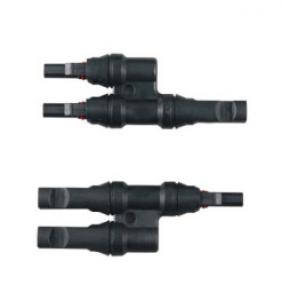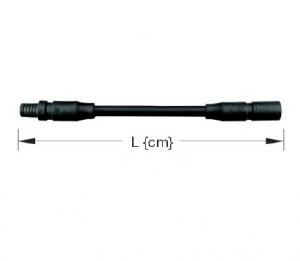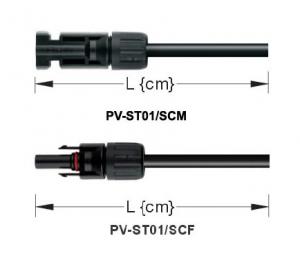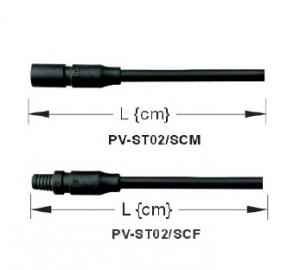Solar Energy Systems Trenton NJ Solar Cable Connector ST01 M F
- Loading Port:
- China Main Port
- Payment Terms:
- TT OR LC
- Min Order Qty:
- -
- Supply Capability:
- 10000 set/month
OKorder Service Pledge
OKorder Financial Service
You Might Also Like
Solar Cable-Connectors,Due to highly robustness,UV-resistance,the touch protection a high grade connection is guaranteed for many years
Rated voltage 1000 V
Rated current 22A
Protection degree(mated,junction box closed/unmated) IP67/IP2X
Operating temperature -40 °c to +85 °c
Contact material Copper,silver plated
Insulation materical PC/PA
Locking system Snap in
- Q: How do solar energy systems contribute to reducing noise pollution compared to traditional power generation methods?
- Solar energy systems contribute to reducing noise pollution compared to traditional power generation methods because they do not rely on mechanical components like turbines or generators that produce loud noises. Instead, solar panels convert sunlight directly into electricity, resulting in a silent operation. This absence of noise helps in creating a more peaceful and less disruptive environment for both humans and wildlife.
- Q: Can solar energy systems be used in powering research laboratories or scientific facilities?
- Certainly, research laboratories and scientific facilities can utilize solar energy systems to provide power. Solar energy is a sustainable and renewable power source that can be harnessed through the utilization of photovoltaic (PV) panels or solar thermal systems. To power various equipment such as microscopes, spectrometers, centrifuges, and other specialized scientific instruments, research laboratories and scientific facilities often require a substantial amount of electricity. By installing solar panels on the roofs or surrounding areas of these facilities, they can generate electricity from sunlight. The electricity generated by solar panels can directly power the laboratory's equipment, reducing their dependence on traditional fossil fuel-based electricity sources. Furthermore, any excess energy produced by the solar panels can be stored in batteries or returned to the grid, ensuring a continuous and reliable power supply. Using solar energy in research laboratories and scientific facilities offers several advantages. Firstly, it helps diminish greenhouse gas emissions and mitigates the environmental impact of these facilities. Solar power is clean and does not generate harmful pollutants, making it an environmentally friendly substitute for conventional electricity sources. Additionally, solar energy systems can provide a stable and cost-effective power source in the long term. While the initial installation costs may be higher, solar panels have a lengthy lifespan and require minimal upkeep. This can result in significant savings on electricity bills over time, enabling research laboratories and scientific facilities to allocate their resources towards other essential research activities. Moreover, solar energy systems can enhance the resilience and reliability of power supply to these facilities. In regions prone to power outages or with unreliable electricity grids, solar panels combined with battery storage can serve as a backup power source, guaranteeing uninterrupted operation of critical scientific equipment. In conclusion, solar energy systems can indeed be utilized to power research laboratories and scientific facilities. They offer numerous environmental, economic, and operational advantages, making them a feasible and sustainable choice for meeting the energy requirements of these vital scientific institutions.
- Q: What is the expected maintenance cost of a solar energy system?
- The maintenance cost of a solar energy system can differ depending on various factors. However, when compared to other methods of generating energy, the maintenance cost of a solar energy system is generally low. Solar panels, which are the crucial component of a solar energy system, are usually designed to be durable and require minimal maintenance. They are constructed to withstand different weather conditions and can last for many years with proper care. However, occasional maintenance may be necessary to ensure optimal performance. The maintenance requirements for a solar energy system typically involve cleaning the panels to remove any dirt, dust, or debris that may accumulate over time. This can be done by using water and a soft brush or with the assistance of automated cleaning systems. It is recommended to clean the panels at least once or twice a year, although this can vary depending on the location and environmental factors. Alongside cleaning, regular inspections of the solar energy system are also vital. This involves checking for any signs of damage, loose connections, or potential issues with the electrical wiring. Inspections can be carried out by the system owner or a professional solar installer, and they are generally done annually. On the whole, the expected maintenance cost of a solar energy system can be relatively low, typically ranging from 0.5% to 1% of the total installation cost per year. This cost mainly covers expenses for cleaning, inspections, and any minor repairs that may be necessary. However, it is important to note that the actual maintenance cost can vary depending on the system's size, location, and specific maintenance requirements. In conclusion, while there are some maintenance tasks associated with a solar energy system, the expected cost is generally low compared to other energy systems. With proper care and regular inspections, a solar energy system can continue to produce clean and renewable energy for many years with minimal maintenance expenses.
- Q: Can solar energy systems be used for powering military bases?
- Yes, solar energy systems can be used to power military bases. In fact, many military bases around the world are increasingly adopting solar energy as a reliable and sustainable source of power. Solar panels can be installed on rooftops, open spaces, or even integrated into buildings' facades, providing clean electricity to support the energy needs of military facilities. This not only helps reduce reliance on fossil fuels but also enhances energy security and resilience for military operations.
- Q: How do solar energy systems affect carbon footprint?
- Solar energy systems have a positive impact on carbon footprint as they harness the power of the sun, a renewable and clean energy source, to generate electricity. By reducing reliance on fossil fuels, solar energy systems significantly decrease carbon dioxide emissions and other greenhouse gases, thereby helping to mitigate climate change and reduce our overall carbon footprint.
- Q: What is the impact of saltwater spray on solar panels?
- Saltwater spray can have several impacts on solar panels. Firstly, the salt in the spray can create a layer of residue on the surface of the panels, which can reduce their overall efficiency. This residue acts as a barrier, preventing sunlight from reaching the photovoltaic cells and reducing the amount of electricity that can be generated. Secondly, the corrosive nature of saltwater can lead to the degradation of the materials used in solar panels. Over time, the salt can cause the metal components and connections in the panels to corrode and weaken, potentially leading to malfunctions or even complete failure of the panels. Additionally, saltwater spray can also affect the structural integrity of the panels. The constant exposure to saltwater can cause the materials to deteriorate, leading to cracks, warping, or other forms of physical damage. This can not only impair the performance of the panels but also pose safety risks. To mitigate the impact of saltwater spray on solar panels, it is essential to regularly clean and maintain them. This involves removing the salt residue and ensuring that the panels are free from any accumulated debris. Proper cleaning techniques and regular inspections can help prolong the lifespan of the panels and maintain their efficiency. Furthermore, selecting solar panels specifically designed for coastal or marine environments can provide added protection against saltwater spray. These panels are often constructed with materials that are more resistant to corrosion and have enhanced durability to withstand the harsh conditions. In conclusion, saltwater spray can have a negative impact on solar panels by reducing their efficiency, corroding their components, and compromising their structural integrity. However, with proper maintenance and the use of suitable panels, these effects can be minimized, allowing solar energy systems to continue operating effectively even in coastal or marine environments.
- Q: Can solar energy systems be used for powering electric vehicle solar charging roads?
- Solar energy systems have the capability to power electric vehicle solar charging roads. To accomplish this, solar panels can be installed either alongside or on top of the charging roads in order to capture and convert energy from the sun into electricity. This electricity can then be utilized to operate the charging infrastructure for electric vehicles, enabling them to charge their batteries while in motion. Furthermore, any surplus energy generated by the solar panels can be stored in batteries or returned to the grid, ensuring a consistent and sustainable power supply for the charging infrastructure. By combining solar energy with electric vehicle charging roads, the reliance on fossil fuels can be reduced and the utilization of renewable energy can be encouraged within the transportation industry.
- Q: What are the advantages of solar energy systems?
- There are several advantages of solar energy systems. Firstly, solar energy is a renewable source of energy, meaning it will never run out as long as the sun continues to shine. This is in stark contrast to fossil fuels, which are finite resources and are being depleted at an alarming rate. Secondly, solar energy is environmentally friendly. Unlike fossil fuels, solar energy systems do not emit harmful greenhouse gases or pollutants that contribute to climate change and air pollution. This makes solar energy a clean and sustainable alternative that helps in reducing our carbon footprint and mitigating the negative effects of global warming. Additionally, solar energy systems can significantly reduce electricity bills. Once the initial investment in installing solar panels is made, the cost of harnessing solar energy is relatively low. Solar energy is free, and the only cost incurred is the maintenance and occasional repair of the equipment. This can lead to substantial long-term savings on energy bills, especially as the cost of traditional electricity continues to rise. Moreover, solar energy systems can provide energy independence. By generating your own electricity, you are less reliant on utility companies and the fluctuating prices of fossil fuels. This independence also provides a level of energy security, as solar energy systems are not vulnerable to supply disruptions or price fluctuations caused by geopolitical tensions or natural disasters. Lastly, the installation of solar energy systems stimulates local economies and job creation. The solar industry has experienced significant growth in recent years, leading to the creation of numerous jobs in manufacturing, installation, and maintenance. This not only boosts the economy but also provides employment opportunities in a rapidly expanding sector. In conclusion, the advantages of solar energy systems are numerous. From being a renewable and environmentally friendly source of energy to reducing electricity bills, providing energy independence, and creating jobs, solar energy is a viable and sustainable solution for our energy needs.
- Q: How does the efficiency of solar panels vary between manufacturers?
- The efficiency of solar panels can differ significantly among manufacturers as a result of various factors. One primary factor is the quality of materials used during production. Panels made with high-quality materials, like monocrystalline silicon, generally exhibit higher efficiency compared to those made with lower-quality materials. Manufacturers also employ diverse manufacturing processes that can impact panel efficiency. For instance, some manufacturers utilize more advanced and precise techniques, resulting in higher efficiency panels. Moreover, the level of experience and expertise of the manufacturer can also influence panel efficiency. Furthermore, panel efficiency can be influenced by the design and engineering of the panels. Manufacturers who invest more in research and development to optimize panel design often achieve higher efficiency. Factors such as the arrangement and quantity of solar cells, electrical connections, and anti-reflective coatings all contribute to overall panel efficiency. Additionally, the size and surface area of solar panels can affect their efficiency. Larger panels generally possess more solar cells and a larger surface area to capture sunlight, leading to higher efficiency. However, this may also result in increased costs and space requirements. Lastly, the efficiency of solar panels can be impacted by the testing and certification processes. Manufacturers that conduct rigorous testing and obtain certifications from recognized authorities tend to produce more reliable and efficient panels. To conclude, the efficiency of solar panels can vary among manufacturers due to factors such as material quality, manufacturing processes, design and engineering, size and surface area, and testing and certification. Consumers should consider these factors when selecting solar panels to ensure they choose the most efficient and reliable option for their specific needs.
- Q: How do solar energy systems impact the transportation sector?
- Solar energy systems impact the transportation sector by providing a renewable source of power for electric vehicles (EVs) and public transportation. Solar-powered charging stations and infrastructure reduce the dependence on fossil fuels, decrease greenhouse gas emissions, and promote sustainable transportation options. Additionally, solar energy can also be used to power auxiliary systems in vehicles, making them more energy-efficient and reducing their carbon footprint.
Send your message to us
Solar Energy Systems Trenton NJ Solar Cable Connector ST01 M F
- Loading Port:
- China Main Port
- Payment Terms:
- TT OR LC
- Min Order Qty:
- -
- Supply Capability:
- 10000 set/month
OKorder Service Pledge
OKorder Financial Service
Similar products
Hot products
Hot Searches
Related keywords






















